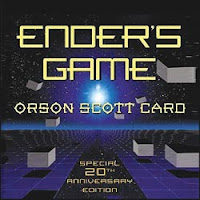 The quote above comes from Orson Scott Card’s science fiction novel Ender’s Game, which I am going to talk about briefly today. Ender’s Game helped to establish Card as a notable science-fiction author, and it spawned several sequels that follow the main characters from Ender’s Game. The book won both the Hugo and the Nebula awards, which is an astonishing feat that only a few SF novels have ever achieved. (Warning: I am going to give away some plot details, so don't read the next paragraph if you don't to hear how the book ends.)
The quote above comes from Orson Scott Card’s science fiction novel Ender’s Game, which I am going to talk about briefly today. Ender’s Game helped to establish Card as a notable science-fiction author, and it spawned several sequels that follow the main characters from Ender’s Game. The book won both the Hugo and the Nebula awards, which is an astonishing feat that only a few SF novels have ever achieved. (Warning: I am going to give away some plot details, so don't read the next paragraph if you don't to hear how the book ends.) The novel bears some striking similarities to Starship Troopers, which I have been talking about a lot recently. As in Heinlein’s controversial classic, mankind is at war with insectoid, hive-minded aliens, and as a result a very militaristic culture has taken hold of Earth. The plot chronicles the story of Ender Wiggin, a genius six-year-old American boy who is conscripted into the military. Ender is shipped off to Battle School, an orbiting space station where similar gifted children are taken to learn military strategy. The children are educated in military tactics with the use of games, notably something known as the Battle Room. This is a zero-gravity chamber in which opposing teams fight in a mock battle with pretend laser guns, similar to a paintball match. There, Ender revolutionizes the game by showing his peers how to use the ability to pick which direction is up in zero-g and how to use that to one’s advantage. (This is where the line “The enemy’s gate is down” comes from—Ender orients himself so that the other sides of the room is down, not forward, so that his legs shield him from enemy fire.) Ender’s strategic genius is soon recognized by the high command, and he is shipped off to another military academy, where he learns military strategy on a larger scale. Soon Ender is forced to command an entire “fleet” in a strenuous series of computer-simulated battles; eventually he becomes so fed up that in one such simulation he completely obliterates an enemy planet so that the game will end and he can stop playing it. After this, it is revealed that this was not a simulation—he actually commanded a fleet and destroyed the alien planet remotely. Ender is then paralyzed by guilt, particularly after traveling to a former enemy planet and realizing that the enemy was not as ruthless as he once thought. The book ends with Ender’s decision to travel and speak for the race he unknowingly destroyed.
Like Starship Troopers, Ender’s Game subtly comments on wartime culture, particularly racism. In the novel, the official term for the aliens is the Formics, but the derogatory slang term “Buggers” is far more prominent. On Earth, the term “Bugger” has become the worst kind of insult. Also, in one scene near the beginning of the novel, it is explained that children play a game called “Buggers and Astronauts,” in which the children stage a pretend battle. Ender remarks that these games often get very violent, and those forced to play the Buggers are often brutally beat up. Though the world government is not as fascist as its counterpart in Starship Troopers, the message that people have a duty to the state is very clear. One character, a military officer, remarks that “human beings are free except when humanity needs them.” This theme is also present in the psychological trickery used to coax out Ender’s brutal side, which the military needs in order to win the war.

Additionally, like in Starship Troopers, the theme of Social Darwinism is ever-present in Ender’s Game. Ender’s normally compassionate self is often forced into being ruthless and cruel. At one point, Ender comments that “The power to cause pain is the only power that matters, the power to kill and destroy, because if you can't kill then you are always subject to those who can, and nothing and no one will ever save you.” This struggle between compassion and ruthlessness is the chief conflict of the book. Interesting, even thought the military is being cruel to Ender by forcing him to fight the Buggers, they justify this claim by saying that they are showing compassion by protecting humanity.
Unlike Starship Troopers, the true message of Ender’s Game is not only subtle but also quite mysterious. Though there are many anti-war themes present in the novel, it is still on the reading lists of many military academies. Card asks many questions, but does not always provide answers. Heinlein, on the other hand, is all about giving answers, whether they are purposely wrong or not.
Overall I strongly recommend the book; it is a fascinating read, short and sweet. I doubt this is the last you will hear about Ender’s Game; many of its themes are universal, and many of its questions remain unanswered.

2 comments:
A very nice review and synopsis but please put a spoiler alert at the top! You give away one of the central twists that make the book so enjoyable.
Nice catch, thanks.
Post a Comment